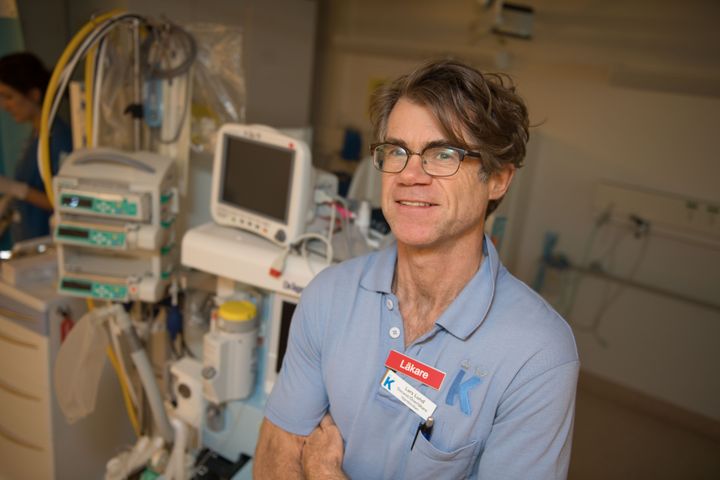Microvascular dysfunction: a common cause of heart failure with preserved pumping capacity
[PRESS RELEASE 2018-08-27] Microvascular dysfunction, or small vessel disease, can be an important cause of heart failure with preserved ejection fraction (preserved pumping capacity), an international team including researchers from Karolinska Institutet and AstraZeneca report in a study published in The European Heart Journal. The results can play a crucial part in identifying people in the risk zone for this type of heart failure and in the development of effective drugs.

Heart failure is the most common reason for hospitalisation and causes much suffering. Heart failure with preserved ejection fraction, which is one of the two main types of heart failure, lacks scientifically proven treatments and more research is needed to understand how the disease develops and is to be treated.
Scientists at Karolinska Institutet, along with colleagues from AstraZeneca and four other groups in Sweden, the USA, Finland and Singapore have now conducted a study of over 200 patients with this type of heart failure.
The study involved the use of an innovative coronary imaging protocol developed by Professor Li-Ming Gan's research group in the IMED Biotech Unit in order to obtain a patient-friendly, cost-effective way to test coronary artery's ability to increase its blood flow (Coronary Flow Reserve - CFR) in addition to the traditional imaging approach to generate overall picture of the heart's structure and function.
”Being able to identify patients with heart failure with preserved ejection fraction is not only key to improving patient outcomes through early diagnosis but also for us to understand the causal mechanisms underlying the disease so we can develop future targeted therapies”, says Professor Li-Ming Gan, Chief Scientist and Senior Medical Director, IMED Biotech Unit, AstraZeneca.
The results of the study, which is the first of its kind, show that 75 per cent of the patients had what is known as microvascular dysfunction. This is a disease in which the coronary artery shows no sign of narrowing or plaque in radiographs, but has damage to the endothelium that coats the inside of the blood vessels. The blood vessels do not work as they should, which can lead to adverse changes in the heart muscle. The researchers therefore draw the conclusion that microvascular dysfunction can be a critical underlying disease mechanism in patients with heart failure in which the ejection fraction is preserved.
”The results will be useful in identifying patients at risk of developing the disease, but above all they'll make an essential contribution to the development of drugs for patients with heart failure with preserved ejection fraction,” says Lars Lund, Senior Consultant and Professor at Karolinska Institutet's Department of Medicine in Solna.
The results are presented today at the European Society of Cardiology (ESC) congress in Munich and published in The European Heart Journal.
The project was financed by AstraZeneca and the researchers are in receipt of grants from the Swedish Research Council, the Swedish Heart and Lung Foundation, the U.S. National Institutes of Health, the American Heart Association, the National Medical Research Council of Singapore, and the Academy of Finland, Finnish Foundation for Cardiovascular Research.
Publication: ”Prevalence Of Microvascular Dysfunction in Heart Failure with Preserved Ejection Fraction: PROMIS-HFpEF”. Sanjiv J. Shah, Carolyn S. P. Lam, Sara Svedlund, Antti Saraste, Camilla Hage, Ru-San Tan, Lauren Beussink-Nelson, Maria Lagerström Fermer, Malin A. Broberg, Li-Ming Gan and Lars H. Lund. European Heart Journal, online 27 August 2018.
Contacts
For more information, please contact:
Lars Lund, Professor, Senior Consultant
Department of Medicine, Solna, Karolinska Institutet
Mobile: +46 70 441 56 87
E-post: lars.lund@ki.se
Images

Karolinska Institutet (http://ki.se/english) is one of the world’s leading medical universities. Its vision is to significantly contribute to the improvement of human health. Karolinska Institutet accounts for the single largest share of all academic medical research conducted in Sweden and offers the country’s broadest range of education in medicine and health sciences. The Nobel Assembly at Karolinska Institutet selects the Nobel laureates in Physiology or Medicine.
Subscribe to releases from Karolinska Institutet - English
Subscribe to all the latest releases from Karolinska Institutet - English by registering your e-mail address below. You can unsubscribe at any time.
Latest releases from Karolinska Institutet - English
New method reveals how the brain and inner ear are formed3.4.2025 20:00:00 CEST | Pressmeddelande
Researchers at Karolinska Institutet have developed a method that shows how the nervous system and sensory organs are formed in an embryo. By labelling stem cells with a genetic ‘barcode’, they have been able to follow the cells’ developmental journey and discover how the inner ear is formed in mice. The discovery, published in Science, could provide important insights for future treatment of hearing loss.
Fluoride in drinking water is associated with impaired childhood cognition7.3.2025 15:30:00 CET | Pressmeddelande
Elevated concentrations of fluoride can occur in well water, and in some countries, it is added to drinking water to counteract caries in the population. A study from Karolinska Institutet in Sweden now supports a few previous studies indicating that exposure to fluoride during the fetal stage or early childhood may impair cognition in children. The study is published in the journal Environmental Health Perspectives.
Children with ARFID face increased risk of disease17.2.2025 17:00:00 CET | Pressmeddelande
Children with avoidant restrictive food intake disorder (ARFID) have an elevated risk of developing psychiatric and physical conditions, a new study from Karolinska Institutet published in JAMA Pediatrics reports. The study highlights the importance of early identification to improve care of these children.
Preterm babies receive insufficient pain management27.1.2025 15:29:17 CET | Pressmeddelande
A large proportion of babies born very early need intensive care, which can be painful. But the healthcare system fails to provide pain relief to the full extent. This is shown by the largest survey to date of pain in neonatal care, now published in the journal Pain.
New study paves way for immunotherapies tailored for childhood cancers20.1.2025 17:00:00 CET | Pressmeddelande
Researchers at Karolinska Institutet and the Astrid Lindgren Children’s Hospital in Sweden have determined how children’s immune systems react to different kinds of cancer depending on their age. The study, which is published in the journal Cell, reveals significant differences between the immune response of children and adults, and has the potential to lead to new tailored treatments for children with cancer.
In our pressroom you can read all our latest releases, find our press contacts, images, documents and other relevant information about us.
Visit our pressroom